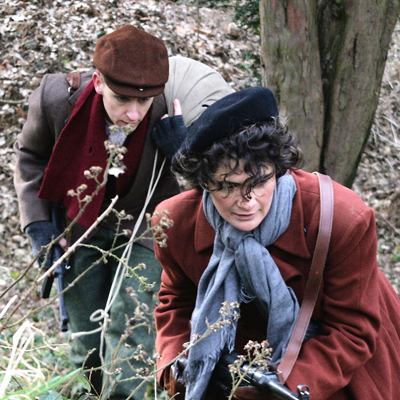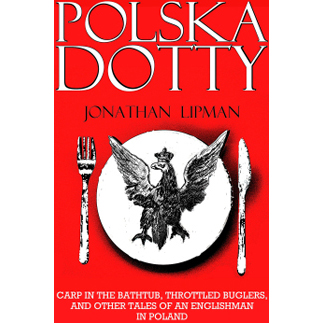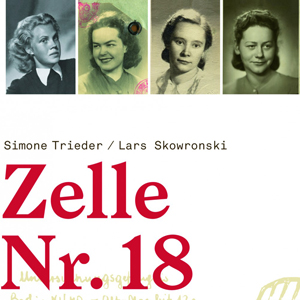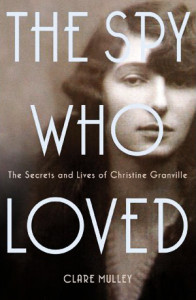 The Spy Who Loved: The Secrets and Lives of One of Britain’s Bravest Heroines
The Spy Who Loved: The Secrets and Lives of One of Britain’s Bravest Heroines
By Clare Mulley
Pan Books, London 2013
The title of this new biography of Krystyna Skarbek is quirky: The Spy Who Loved. Loved whom, loved what? Is something missing? Is it a play on Ian Fleming’s The Spy Who Loved Me? Start reading; you are about to meet a woman unlike any other.
Clare Mulley’s Preface sets the stage by presenting a most unusual scenario: a half a dozen men, all former lovers and colleagues of the alluring and enigmatic Krystyna, meet in a London club after her death promising to ensure that her reputation would never be tarnished by sensationalism. They all had loved her and all clearly respected the fact that she, in turn, had simply… loved. This misguided gallantry – Skarbek never courted anyone’s approval – may have deprived her of the recognition she deserved while shielding those responsible for the disgraceful treatment she got from the country she served.
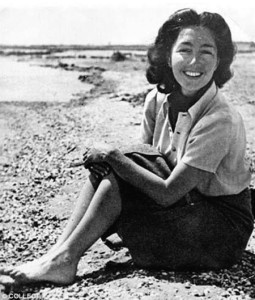
Courtesy of St. Martin’s Press
Clare Mulley’s thoroughly researched and well-written biography makes up for the decades of unseemly silence with a layered, textured, richly coloured character portrait of a loyal, courageous, heroic woman.
Krystyna Skarbek, also known by other names, first those of her two husbands and then by her noms de guerre, was born in Warsaw in 1908. Her father, Count Skarbek, a charming but impoverished aristocrat, and her Jewish mother, Stefania Goldfeder, an heiress to a banking fortune had married, respectively, for money and for social position, not an unusual arrangement in Europe among that class at that time. Krystyna was raised in luxury on a grand estate where she spent much time with her father, acquiring at an early age the skills he valued: riding, skiing, shooting and even handling a knife, as well as self-confidence and a zest for adventure. However, her father was as distant from her mother as he was close to his daughter. When the world economy collapsed, so did the Goldfeder fortune, the marriage, and Krystyna’s carefree life.
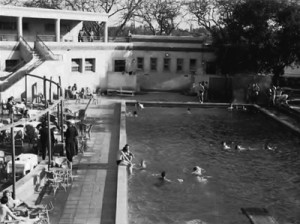
The Gezira Sporting Club in Cairo, 1943, a not-so-secret gathering place for secret agents
Courtesy of St. Martin’s Press
Her father gone, she and her mother lived in a modest apartment in Warsaw, where riding and shooting hardly prepared her for a working life. But, beautiful and charming, she won the Miss Poland contest and worked for a while in a car dealership where she met her first husband, a boring but wealthy businessman who enabled her to restore some luxuries to her mother’s life. Restless, she soon divorced him and moved on to a more interesting man, Jerzy Gizycki, intellectual, adventurous, well connected, and well off. They skied in Zakopane and France, and traveled round Europe, including London.
In 1938, Gizycki was asked to open a consulate in British East Africa. Gizycki had spent time in Africa before and while he hated colonialism, he loved the continent. It was a posting that appealed to both of them but their African idyll was not to last. Scarcely a year later, Hitler attacked Poland, and both Jerzy and Krystyna wanted nothing more than to get back to Europe and join the fight for their homeland.
By the time they got to England, access to Poland was completely cut off by the Germans in the west and the Soviets in the east, so Krystyna presented herself to the British Secret Service, Special Operations Executive (SOE), persuaded them to accept her as their first female agent and give her exactly the assignment she wanted. From this point on, she is known as Christine Granville.
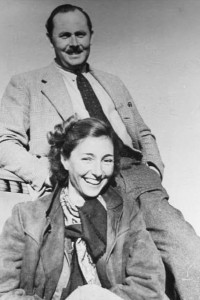
With Andrzej Kowerski in Syria
Courtesy of St. Martin’s Press
While her husband headed for France in the hope of joining Polish forces regrouping there, Christine embarked on her first mission. Using Hungary as a base, she skied across the Carpathian mountains through Slovakia and into occupied Poland, a harrowing and dangerous journey. But she made it, encountering frozen bodies of people who had attempted to escape, establishing invaluable contacts for future espionage, and bringing back microfilmed documents to the British. At this point, she began her long affair with Andrzej Kowerski, a Polish agent working for the British whom she had met years earlier. As fearless and determined as Christine, he was an amputee yet nevertheless joined Christine on her second skiing trek into Poland and later parachuted into France. They stayed together in Budapest where they established a network of agents (and Christine a succession of lovers), but eventually they aroused the suspicion of the Gestapo. They escaped to Istanbul, a road trip in Kowerski’s Opel that eventually took them all the way to Cairo.
Mulley’s description of the SOE in Cairo is illuminating about the adrenalin-charged atmosphere of wartime agents, and an amusing insight into some of the raw material for Ian Fleming’s Bond novels. Perfectly ordinary men and women who had left conventional lives behind them suddenly found themselves in an exotic locale where, when not on a dangerous mission, they have time on their hands. What better way to fill it than with alcohol and sex? Not a few of the “girls” who worked in administration had to cut their careers short and return to England, thoroughly pregnant.
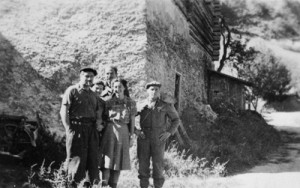
With the Marquis in France, August 1944
Courtesy of St. Martin’s Press
Christine was never one of “the girls.” She drank very little, did not go to many parties, and absolutely refused to go near a typewriter. She found the time spent waiting for an assignment interminable, tedium only relieved by time spent with lovers. Some of them, casual and quickly forgotten, remain nameless. But others were good friends and stayed that way, among them the unusual group described in the Preface.
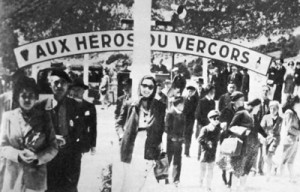
Celebrating victory in Vercors, France
Courtesy of St. Martin’s Press
When at last Christine was assigned to parachute into France to join the Marquis in Vercors, headed by the British-Belgian agent Francis Cammaerts, she assumed yet another identity, that of a journalist, Jacqueline Armand. Her exploits there and in the Italian Alps are legendary, and the danger, tension and excitement in Vercors created the perfect atmosphere for Christine’s inevitable affair with Francis. All the more fitting then that her crowning achievement in France was the rescue of three British agents from a Gestapo prison, among them none other than Francis Cammaerts.
When the war ended, Christine faced a bitter reality: Poland, whose freedom she had fought for, had been betrayed and handed over to Stalin; under communist rule, both her social class and her work for the western allies would have gravely imperiled her. Yet Britain, the country that she had so loyally and bravely served, would neither offer her a job nor even citizenship. Her only rewards were medals, among them the George Medal and the Croix de guerre. While her friends remained loyal, being stateless severely limited her options. After a stint as a waitress she accepted a job as a hostess on a cruise ship. A steward on this ship, Dennis Muldowney, became obsessed with her. Spurned, he stalked her and finally, in a fit of rage, killed her in the lobby of her hotel.
Clare Mulley’s research is impressive, interviewing family, friends, and even relatives of the unfortunate Muldowney; she examined private correspondence, scoured public and private archives, and lists an extensive bibliography. She paints a vivid picture of Christine’s prewar life and of the war years, and shows a good understanding of the desperate situation of Poland, and Poland’s complicated relationship with Britain. The Poles, though fighting with Britain on every front – often brilliantly as in Tobruk and in the Battle of Britain – did not entirely trust this ally, a feeling that unfortunately proved well founded.
Ah, perfidious Albion!
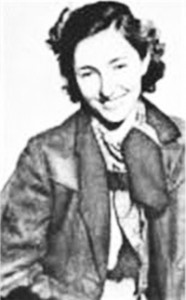
Courtesy of St. Martin’s Press
Did Mulley do justice to Christine? I think that panel of former lovers would approve, even Andrzej Kowerski who had finally persuaded Christine to marry him just before she was murdered. Mulley clearly admires Christine, portrays her faithfully as a woman whose loyalty was unshakable, and her courage breathtaking; a woman who would risk everything for her country, its allies, and her comrades. She was also a woman who set her own moral standards, made her own choices. Her style was elegant, dignified, even modest: the author frequently notes how Christine dressed: in a simple skirt and tailored shirt, well cut. She did nothing to attract attention, yet both men and women noted her magnetism. Her view of sex – and of marriage – was relaxed, pretty much the same as that of all her male colleagues at that time, sex a pleasure, marriage a restriction.
It is surprising that to date no film has been made about Granville though the idea has been considered. But who among the current crop of half-dressed, cosmetically altered and empty-headed “stars” could possibly portray a smart, courageous woman described by SOE colleagues as “a law unto herself.”
CR
